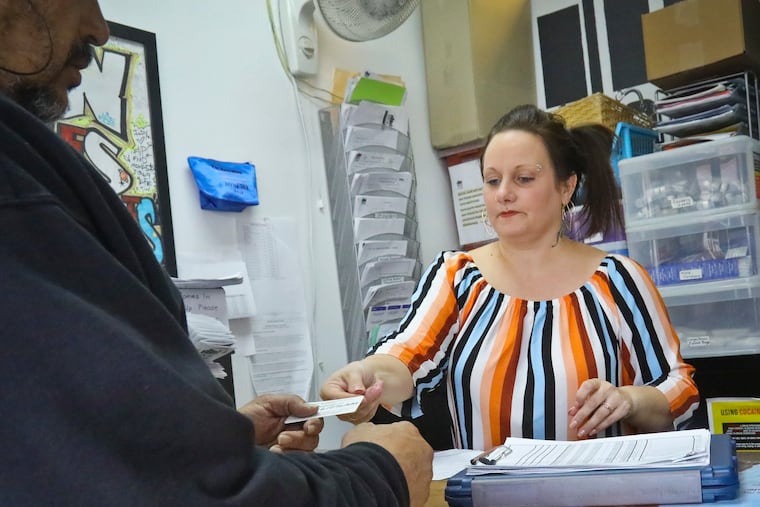Discriminating against people with opioid use disorder is a violation of the ADA
Discriminating against people being treated for opioid use disorder isn’t just wrong. It may be unlawful.

A few years ago, Pennsylvania released an infographic that illustrated a path to recovery for people struggling with addiction. It showed a road with twists and turns, but a single direction, marked by steps such as medication to reverse an overdose and emergency care. At the end, there is a seemingly effortless “warm handoff,” where a patient can go from the emergency department to a drug treatment provider and program in a single step.
This image popped into my head while I was talking to a local family whose loved one had almost died of an overdose. I listened quietly as the family wept with fear and frustration at how hard it was to navigate opioid addiction, and how impossible it seemed to get ongoing help. But this was not an accidental opioid overdose — it was an intentional suicide attempt using antidepressant medications. The accompanying note read simply: “I can’t take the pain of addiction any longer.”
“The accompanying note read simply: ‘I can’t take the pain of addiction any longer.’”
The road to addiction treatment and recovery is far more difficult to navigate than the one reflected in the poster. I have long lamented the complexities and disparities of mental health services, particularly for those living with addiction. It’s not just made of twists and turns, but multiple on- and off-ramps, giant barriers or roadblocks, and dead ends. As an emergency physician, I operate under the belief and practice that any life-threatening illness or situation demands focused, timely, and streamlined attention and resources. Yet this is most often not what those who are struggling with addiction, or their families, experience. This lack of support pushed my patient to abject hopelessness and an attempt to end their life.
On April 5, the Department of Justice’s Division of Civil Rights issued a bold statement: People who are in recovery from opioid use disorder have a disability, and cannot be discriminated against. In plain terms, this means that people who are receiving addiction treatment — especially those taking medication such as methadone, buprenorphine, or naltrexone (MOUD) — cannot be denied services, including continuing access to their medication.
Reading this document unleashed a floodgate of memories of patients who had been penalized for being in treatment. I thought about a patient who had been turned away from receiving treatment at a skilled nursing facility simply because they were on methadone. Another patient was brought to the ED, vomiting and severely dehydrated, after being in a jail cell for three days without their prescribed buprenorphine, despite requests for their medication. I once saw a middle-aged man on methadone treatment who was brought to the ED because he was suicidal, only to wait for more than a week for an inpatient psychiatric bed because finding one that also provides methadone treatment feels next to impossible.
With each one of these patients, I would get incensed by how unjust our systems were for them. Now, I know that these examples weren’t just unfair — they were in violation of the Americans with Disabilities Act (ADA). Recently, the Department of Justice filed suit against the Pennsylvania court system for violating the ADA by limiting access to medications to treat opioid use disorder among people under court supervision.
» READ MORE: Philadelphia’s overdose crisis hangs in the balance of conflicting city, state, and federal officials | Opinion
Unfortunately, our ability to provide access to treatment for addiction — and for mental and behavioral health in general — feels as if it is crumbling. Brandywine Hospital closed in February, taking away its 64 inpatient psychiatric beds and adolescent psychiatric services. Recently, we learned that the Crozer system would be closing much of its substance use disorder and mental health services in Delaware County by June. Philadelphia services were stretched even before the pandemic hit, and are now often beyond capacity.
For years, much effort has been put into increasing access to medication treatment for opioid use disorder, mainly at the level of individual physicians and treatment providers. Yet Philly providers who can prescribe often don’t, due to issues such as stigma, lack of coordination with the care team (including with other medical facilities), inadequate resources to support primary care offices, and problems with reimbursement from insurance.
Emergency departments have long been the only place many can turn to in crisis. But the pandemic has left us in the ED with fewer options for those with great and growing needs. The “not my problem” mentality must stop. For the sake of our patients and communities, all facets of the health-care system — including rehab units, skilled nursing facilities, psychiatric and medical inpatient units, to name a few — must be willing and able to offer medications that have been shown to be effective and lifesaving in treating opioid use disorder.
The health-care system has been allowed to overlook or ignore the data and evidence backing addiction treatment with medications for opioid use disorder for long enough. It has isolated treatment and recovery in a silo. This is no longer merely inequitable, unjust, and unscientific — it may also be unlawful.
If you or someone you know is thinking of suicide, call the National Suicide Prevention Lifeline at 1-800-273-8255 or text TALK to the Crisis Text Line at 741741.
Priya E. Mammen is an emergency physician and public health specialist. She served as a cochair for the community advisory board of DBHIDS, is a fellow of the Lindy Institute for Urban Innovation at Drexel University, and is adjunct faculty of health and societies at the University of Pennsylvania.